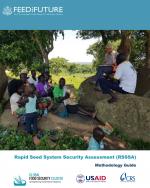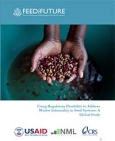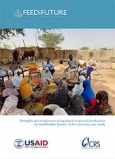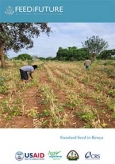Tool Kits | July 26, 2023
Rapid Seed System Security Assessment (RSSSA) Tools
In response to demand for a more rapid and less resource-intensive seed system assessment than the standard Seed System Security Assessment (SSSA), the CRS-led S34D project along with the global Food Security Cluster (gFSC) has developed a set of rapid tools. These tools will provide a rapid way to understand the local seed situation if contemplating a seed response to a crisis or planning for more longer-term development. All tools included in this kit were also designed to be conducted either by phone or in person.
The tools allow us to identify community level seed security issues in terms of access, availability, and quality of preferred farmer seed. The tools will enable us to determine if seed security is an issue at farm level, and if so, what elements need to be addressed. The tools allow for a gender, youth, and PWD lens to be applied during the analysis and response decisions. All questionnaires are available in Microsoft Word. Several of these questionnaires have been digitized in Kobo with automatic analysis through PowerBi.
Methodology Guide
The methodology guide provides an overview to the RSSSA, lays out how the assessments are usually organized, presents the steps in an RSSSA and using the findings to determine an appropriate response.
Rapid Seed System Security Assessment (RSSA) - Methodology Guide
Document type: Microsoft Word
Download: English
Questionnaires
Agricultural expert interview
This interview(s) is part of the initial information gathering to better understand the context to make planning for data collection more effective. The information collected from the interview will allow for better targeting of the respondents, narrow down crop options, and help identify the appropriate cropping season for any seed response, so this interview should be conducted prior to field work planning.
Rapid Seed System Security Assessment (RSSA) - Local Agriculture Expert Interview
Document type: Microsoft Word
Download: English
Household questionnaire
The individual household questionnaires give insight into how families obtain seed for major crops. The household questionnaire is designed to gather key quantitative information which can complement some of the other qualitative SSSA information sources.
Rapid Seed System Security Assessment (RSSA) - ShapeGender Sensitive HH Interview Seed Access and Availability
Document type: Microsoft Word
Download: English
Focus group guide
Focus groups are also key for identifying quickly critical constraints (and opportunities) linked to issues such as seed storage, seed quality, and new variety access. They also examine gender differences in crop production, storage, and seed management.
Rapid Seed System Security Assessment (RSSA) - Focus Group-Rapid Seed System Security Assessment
Document type: Microsoft Word
Download: English
Seed producer/Seed companies
These surveys are conducted with local formal (certified) seed companies and also intermediate (e.g., Quality Declared Seed) seed system producers to better understand the local seed supply chain constraints and opportunities for quality seed production and sale in the zone.
Rapid Seed System Security Assessment (RSSA) - Seed Producer/Company Key Informant Interview
Document type: Microsoft Word
Download: English
Agrodealer questionnaire
Permits us to understand the retail side of formal seed, what varieties are available to local farmers and at what price.<
Rapid Seed System Security Assessment (RSSA) - Agrodealer/Seed Supplier Interview-Rapid Seed System Security Assessment
Document type: Microsoft Word
Download: English
Grain trader questionnaire
Grain traders are often an important source of seed for farmers. They can be used to assess overall market functioning and then explore immediate seed security issues (availability, quality, price).
Rapid Seed System Security Assessment (RSSA) - Grain Vendor-Rapid Seed System Security Assessment
Document type: Microsoft Word
Download: English
Digital Data Collection through Enketo Express Kobo Toolbox & PowerBi Analysis Visualization
Three main tools (Household, Agrodealer, and Grain trader questionnaires) have been digitized with automatic data analysis. All these tools are accessed in KOBO and are analyzed using a POWER BI dashboard. The guide provides explanations on how these tools are used to collect data, and how the data is analyzed and presented in POWER BI. Templates are provided for the digital questionnaires and PowerBi analysis. KOBO software is downloaded for free from the internet at:
KoboToolbox
- Digital Data Collection and Visualization Guide
Document type:PDF
Download: English - Household Data Collection and Analysis Tools
KOBO Data Collection: English
Power Bi Analysis Tools:For access to the PowerBi Dashboard, please email our experts at [email protected].
- Agrodealer and Seed Supplier Data Collection and Analysis Tools
KOBO Data Collection: https://kobo.humanitarianresponse.info/#/forms/aMj99ByyiBMRp3QkNeFhaH/landing
Power Bi Analysis Tools: For access to the PowerBi Dashboard, please email our experts at [email protected].
- Grain Trader Data Collection and Analysis Tools
KOBO Data Collection: https://kobo.humanitarianresponse.info/#/forms/aQbHPcksQJQD9ho4uchAov/landing
Power Bi Analysis Tools: For access to the PowerBi Dashboard, please email our experts at [email protected].
Field Team Training
Training for the RSSSA team is provided. The adjustable training includes a guide and 3 PowerPoint slide presentations. The training covers concepts in seed security, seed assessment, gender and seed, and practice of the various data collection tools.
Rapid Seed System Security Assessment (RSSA) - Training Plan
Document type: Microsoft Word
Download: EnglishRapid Seed System Security Assessment (RSSA) - Seed System Basics
Document type: PPT
Download: EnglishRapid Seed System Security Assessment (RSSA) - Seed System Assessment
Document type: PPT
Download: EnglishRapid Seed System Security Assessment (RSSA) - S34D RSSSA & Gender
Document type: PPT
Download: English
Seed Mapping Tool:
Designed to be used during the analysis of the results, this tool enables one to visualize the seed supply chain and synthesize relevant information on each link.
Rapid Seed System Security Assessment (RSSA) - Seed Mapping
Document type: Excel
Download: English
Completed Assessments:
Description TBA
Seed System Experts:
Seed system experts are available to provide guidance for a specific phase of the RSSSA or potentially lead an entire RSSSAA short list of seed system experts is provided. Depending on the length of time required for the support, these experts may charge for their services.
List of Experts & Contact info
Rapid Seed System Security Assessment (RSSA) - Experts
Document type: PDF
Download: English
For further information, comments, or suggestions please contact our experts at [email protected].





